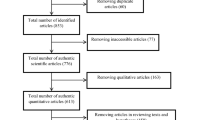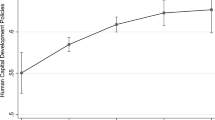Abstract
A survey of middle level managers in India (n=150) showed that when respondents perceived that successful managers in their organization behaved unethically their levels of job satisfaction were reduced. Reduction in satisfaction with the facet of supervision was the most pronounced (than with pay or promotion or co-worker or work). Results are interpreted within the framework of cognitive dissonance theory. Implications for ethics training programs (behavioral and cognitive) as well as international management are discussed.
Similar content being viewed by others
References
Aronson, E.: 1968, ‘Dissonance Theory: Progress and Problems’, in R. P. Abelson, E. Aronson, W. J. McGuire, T. M. Newcomb, M. J. Rosenberg and P. H. Tannenbaum (eds.), Theories of Cognitive Consistency (Rand McNally, Chicago), pp. 5–27.
Aupperle, K. E., A. B. Carroll and J. D. Hatfield: 1985, ‘An Empirical Examination of the Relationship between Corporate Social Responsibility and Profitability’, Academy of Management Journal 28, 446–463.
Brenner, S. N. and E. A. Molander: 1977, ‘Is the Ethics of Business Changing?’, Harvard Business Review 55(1), 57–71.
Cyriac, K. and R. Dharmaraj: 1994, ‘Machiavellianism in Indian Management’, Journal of Business Ethics 13, 281–286.
Donaldson, T.: 1989, The Ethics of International Business (Oxford University Press, New York).
Dozier, J. B. and M. P. Miceli: 1985, ‘Potential Predictors of Whistle-Blowing: A Prosocial Behavior Perspective’, Academy of Management Review 10, 823–836.
Festinger, L.: 1942, ‘A Theoretical Interpretation of Shifts in Level of Aspiration’, Psychological Review 49, 235–250.
Ford, C. R. and D. W. Richardson: 1994, ‘Ethical Decision Making: A Review of the Empirical Literature’, Journal of Business Ethics 13, 205–221.
Gatewood, R. D. and A. B. Carroll: 1991, ‘Assessment of Ethical Performance of Organization Members: A Conceptual Framework’, Academy of Management Review 16, 667–690.
Heider, F.: 1958, The Psychology of Interpersonal Relations (Wiley, New York).
Hunt, S. D., L. B. Chonko and J. B. Wilcox: 1984, ‘Ethical Problems of Marketing Researcher’, Journal of Marketing Research 21, 309–324.
Isen, A.: 1984, ‘Toward Understanding the Role of Affect in Cognition’, in R. S. Wyer and T. K. Srull (eds.), Handbook of Social Cognition 3 (Erlbaum, Hillsdale, NJ), pp. 290–311.
Kohlberg, L.: 1984, The Philosophy of Moral Development (Harper & Row, San Francisco, CA).
Kulik, C. T. and M. L. Ambrose: 1992, ‘Personal and Situational Determinants of Referent Choice’, Academy of Management Review 17, 212–237.
Michalos, A. C.: 1991, Global Report on Student Well-Being. Volume III: Employment, Finances, Housing, and Transportation (Springer-Verlag, New York).
Murphy, P. R., J. E. Smith and J. M. Daley: 1992, ‘Executive Attitudes, Organizational Size, and Ethical Issues: Perspectives on a Service Industry’, Journal of Business Ethics 11, 11–19.
Osgood, C. H. and P. H. Tannenbaum: 1955, ‘The Principle of Congruity in the Prediction of Attitude Change’, Psychological Review 62, 42–55.
Robertson, D. C.: 1993, ‘Empiricism in Business Ethics: Suggested Research Directions’, Journal of Business Ethics 12, 585–599.
Schwartz, S. H., K. A. Feldman, M. E. Brown and A. Heingartner: 1969, ‘Some Personality Correlates of Conduct in Two Situations of Moral Conflict’, Journal of Personality 37, 41–57.
Sethi, P. S. and P. Steidlmeier: 1993, ‘Religion's Moral Compass and a Just Economic Order: Reflections on Pope John Paul II's Encyclical Centesimus Annus’, Journal of Business Ethics 12, 901–918.
Sheehan, T. J., S. D. R. Husted, D. Candee, C. D. Cook and M. Bargen: 1980, ‘Moral Judgment as a Predictor of Clinical Performance’, Education and the Health Professions 3, 392–403.
Trevino, L. K.: 1986, ‘Ethical Decision Making in Organizations: A Person-Situation Interactionist Model’, Academy of Management Review 11 601–617.
Victor, B. and J. B. Cullen: 1990, ‘A Theory and Measure of Ethical Climate in Organizations’, in W. C. Frederick and L. E. Preston (eds.), Business Ethics: Research Issues and Empirical Studies (JAI Press, Greenwich, CT), pp. 77–97.
Vitell, S. J. and D. L. Davis: 1990, ‘Ethical Beliefs of MIS Professionals: The Frequency and Opportunity for Unethical Behavior’, Journal of Business Ethics 9, 63–70.
Zabid, A. R. M. and S. K. Alsagoff: 1993, ‘Perceived Ethical Values of Malaysian Managers’, Journal of Business Ethics 12, 331–337.
Author information
Authors and Affiliations
Additional information
Chockalingam Viswesvaran is assistant professor at Florida International University. His research interests include business ethics and personnel management. He has published in Journal of Applied Psychology, Organizational Behavior and Human Decision Processes, and Relations Industrielles.
Satish P. Deshpande is associate professor at Western Michigan University. His research interests include business ethics, managerial decision making. He has published in Academy of Management Journal, Organizational Behavior and Human Decision Processes, Relations Industrielles, and Human Relations.
Rights and permissions
About this article
Cite this article
Viswesvaran, C., Deshpande, S.P. Ethics, success, and job satisfaction: A test of dissonance theory in India. J Bus Ethics 15, 1065–1069 (1996). https://doi.org/10.1007/BF00412047
Issue Date:
DOI: https://doi.org/10.1007/BF00412047




